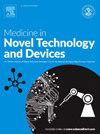人工智能和生物传感器:改变癌症诊断
Q3 Medicine
引用次数: 0
摘要
癌症是世界范围内导致死亡的主要原因之一。早期发现癌症对癌症治疗和提高生存率起着决定性的作用。传统的癌症检测方法,如活组织检查、成像和血液检查,通常是侵入性的、耗时的,而且它们的结果存在准确性问题。与人工智能集成的生物传感器在癌症诊断中发挥着重要而不断发展的作用,为癌症的早期检测、监测和治疗提供了非侵入性、快速、高灵敏度的方法。生物传感器检测与癌细胞或肿瘤相关的特定生物标志物,如核酸(DNA、RNA)、小分子、多肽、蛋白质和代谢物。近年来,许多预测人工智能模型和生物信息学工具被开发出来,以集成生物传感器,成为癌症诊断的有力工具。本文探讨了生物传感器在癌症检测中的作用,通过生物传感器技术开发和应用预测人工智能模型和生物信息学工具进行癌症检测,以及与临床应用相关的挑战。本文章由计算机程序翻译,如有差异,请以英文原文为准。
Artificial intelligence and biosensors: Transforming cancer diagnostics
Cancer is one of the leading causes of death worldwide. Early detection of cancer can play a decisive role in cancer treatment and improving survival rates. Conventional cancer detection methods, such as biopsy, imaging and blood tests are generally invasive and time-consuming, and their results have accuracy issues. Biosensors with artificial intelligence integration play a significant and evolving role in cancer diagnostics, offering non-invasive, rapid, and highly sensitive methods for early detection, monitoring, and treatment of cancer. Biosensors detect specific biomarkers associated with cancerous cells or tumours, such as nucleic acid (DNA, RNA), small molecules, peptides, proteins and metabolites. In recent years, many predictive artificial intelligence models and bioinformatics tools have been developed to integrate biosensors, emerging as powerful tools for cancer diagnostics. This review explores the role of biosensors in cancer detection, the development and application of predictive AI models and bioinformatics tools in cancer detection through biosensor technologies, and the challenges associated with their clinical adoption.
求助全文
通过发布文献求助,成功后即可免费获取论文全文。
去求助
来源期刊

Medicine in Novel Technology and Devices
Medicine-Medicine (miscellaneous)
CiteScore
3.00
自引率
0.00%
发文量
74
审稿时长
64 days
 求助内容:
求助内容: 应助结果提醒方式:
应助结果提醒方式:


